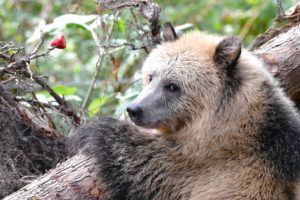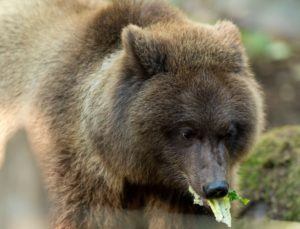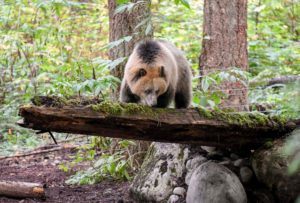Hawthorne prefers fruit and meat.
Huckleberry loves lettuce and butternut squash.
But when you’re caring for two growing 125-pound grizzly cubs, the biggest challenge is just keeping them fed.

Play, eat, repeat
“They play hard and eat a lot,” says Angela Gibson, carnivore keeper, who’s been looking after the cubs nearly full-time since they arrived in August, along with fellow keeper Haley Withers.
The cubs eat first thing in the morning, last thing at night and a midday snack – but they also forage during their outside public times on lettuce and fruit that Gibson hides around their habitat in logs and branches.
During training times, the keepers will also use the cubs’ favorite foods as rewards for certain behaviors. These include natural actions like sitting, standing, putting paws up or opening their mouth, all of which allow Trek keepers and veterinary staff to check on the bears’ health and give them the care they need.

Eat seasonal
Grizzly bears are omnivorous, eating whatever is in season locally. In the Northwest, that means plant buds and flowers in spring; fish, bee larvae and honey in summer; fruit, nuts and insects in fall and plants, grasses and carrion in winter.
Huckleberry, the blond cub who was orphaned last winter in Montana, will eat just about anything, says Gibson. He’s a determined forager, nosing and exploring his surroundings until he finds every bit of food – even eyeing the crows that get too close.
Hawthorne, who was orphaned in Alaska (both cubs are now about nine months old), is a little pickier: He’ll eat his veggies, but he’d prefer fruit or meat. And he definitely doesn’t like asparagus.

Try new foods
For both, however, butternut squash, carrot and sweet potato are favorites. Gibson is gradually introducing new food types, based on nutritional needs and the cubs’ abilities.
“They don’t quite know what to do with corn on the cob just yet,” she smiles.They’re also still learning how to deal with bones, especially fish and meat. That would have been one of the things they learned from their moms, had they not been orphaned. For now, Trek staff cut it up for them into chunks.
But simply keeping up with their energy output is a challenge – like any toddlers, the bear cubs play hard. Right now they weigh 125 pounds each, but over the next six years they’ll grow to be full-size adult grizzlies weighing up to 800 pounds.
That’s a heck of a lot of veggies.
SEE THEM: You can see Hawthorne and Huckleberry every day from 9:30-11:30am and 1-3pm at Northwest Trek.
LEARN MORE: Visit our grizzly cub page.
-Rosemary Ponnekanti, Northwest Trek